Restaurant & Hospitality Update
By William M. Borchard
We happily bring you our latest update summarizing selected pending or decided cases and legal issues we believe are interesting and instructive for the Restaurant & Hospitality Industries.
FAMOUS JOE’S PIZZA volcano erupts
In August 2004, the Pozzuolis family, who owned Famous Joe’s Pizza in Manhattan’s Greenwich Village, fired Victor Zarco. Mr. Zarco thereafter opened a pizzeria in Brooklyn calling it "Famous Joe’s Pizza of the Village." The Pozzuolis family learned of the rival in 2010 but did nothing about it for another seven years. But when Mr. Zarco put up a sign in Brooklyn that was nearly indistinguishable from the Manhattan sign and made only a slight change in response to a demand, suit was brought in the U.S. District Court for the Eastern District of New York.
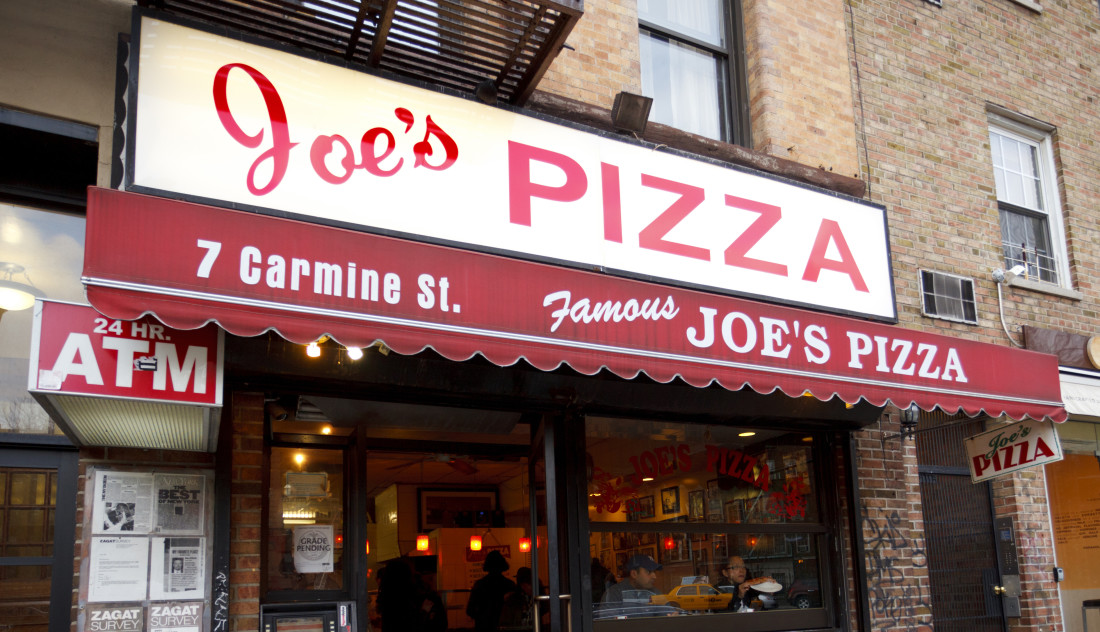 | 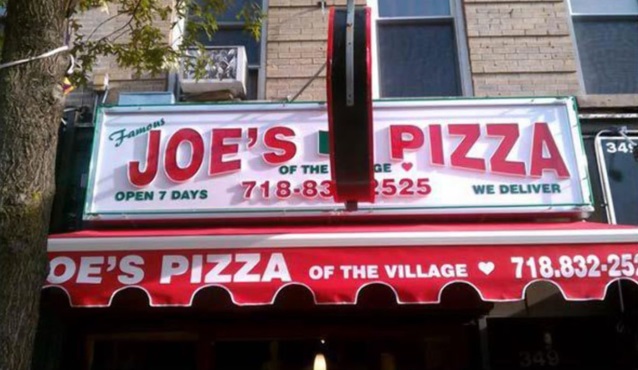 |
| DW labs Incorporated / Shutterstock.com | Court Document |
The Court issued a preliminary injunction and pointed out that Mr. Zarco’s restaurant also showed photographs of Tobey Maguire (who played Peter Parker, an underperforming pizza delivery man for Famous Joe’s Pizza in the 2004 film Spiderman 2) that had been taken at the Manhattan restaurant, and had posted similar social media images. Within weeks, the Pizzuolis family claimed that Mr. Zarco was in contempt and a flurry of letters to the Judge ensued. The Court declined to find contempt but issued an order that clarified the preliminary injunction’s requirements.
Famous Joe’s Pizza, Inc. v. Famous Joe’s Pizza of the Village, Inc., 2018 U.S. Dist. LEXIS 63892 (E.D.N.Y. April 16, 2018). The parties subsequently agreed to a settlement decree that provides detailed requirements including the deletion of “Famous” and “of the Village” from Mr. Zarco’s restaurant’s name and limits on the photographs that can be used to show Mr. Zarco’s former affiliation with the Manhattan restaurant.
Intervening user of 5IVESTEAK restaurant name prevented update of earlier 5IVE RESTAURANT
Inn at St. John’s, LLC registered and used the name 5IVE RESTAURANT in logo form. When it sought to register the same logo but substituted the word STEAKHOUSE for RESTAURANT (and added a knife and fork design), the Examiner refused registration because of an intervening registration of 5IVESTEAK as a restaurant mark which was more than five years old so it could no longer be cancelled on the ground of priority or likelihood of confusion.
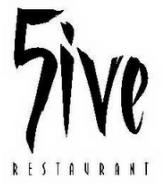

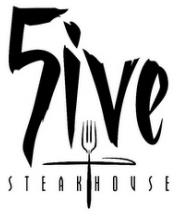
On appeal, the Trademark Trial and Appeal Board (TTAB) affirmed this refusal. It held that the two marks created a similar commercial impression, notwithstanding the existence of Inn at St. John’s earlier registration and the weakness of the terms STEAKHOUSE and RESTAURANT.
In re Inn at St. John’s, LLC, Serial No. 87075988 (T.T.A.B. June 6, 2018). The applicant has appealed this decision to the Court of Appeals for the Federal Circuit.
Two Korean barbecue restaurants fight over the HONEY PIG name
LP Global, Inc. (LPG) opened a Korean barbecue restaurant in Georgia in 2007 using the name HONEY PIG. It applied to register HONEY PIG & design in August 2009. The examiner cited an application that had been filed less than 2 months earlier by Seoul Gool Dae Gee, Inc. (SGDG) to register the Korean equivalent of HONEY PIG & a different design for a Korean barbecue restaurant it had opened in 2008 in Virginia after LPG had opened its restaurant. LPG did not respond to the examiner and its application was abandoned.
Meanwhile, SGDG’s mark was registered, and the parties continued to co-exist for 10 years with no proven instances of actual confusion. But when SGDG sought to register HONEY PIG in plain lettering, LPG opposed based on its priority of use of that mark. SDGD at first argued that its existing registration gave it the right to register its mark in plain letters, but it did not pursue that position. Instead, it argued that the co-existence was enough to show no likelihood of confusion.
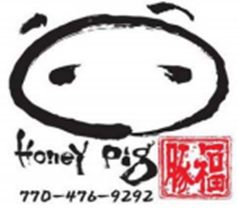 |
| LPG's Application |
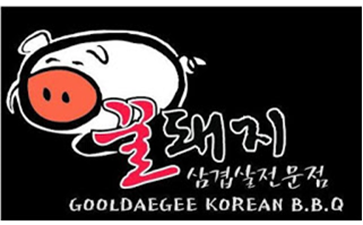 |
| SGDG's Regsitrations |
HONEY PIG [in standard characters]
The TTAB sustained LPG’s opposition and refused to register SGDG's standard character mark since the marks were similar in appearance and identical in meaning and sound, and the services, channels of trade and classes of customers were legally identical.
LP Global, Inc. v. Seoul Gool Dae Gee, Inc., Opposition No. 91221967 (T.T.A.B. March 13, 2018).
Subsequent history: On September 18, 2018, LPG sought to shore-up its registration rights by filing application Serial No. 88121727 to register its HONEY PIG mark in standard characters for “restaurant services” in Class 43 claiming use since December 12, 2007. Might it be blocked by SGDG's registration? See In re Inn at St. Johns, LLC, Application No. 87075988 (T.T.A.B. June 6, 2018), now on appeal to the Federal Circuit (5IVE RESTAURANT was blocked from registering 5IVE STEAKHOUSE by the intervening registration of 5IVESTEAK).
Takeaway: The lesson here is that it may be less expensive in the long run to promptly take action against a subsequent use or application to register a restaurant name similar to yours. You are likely to learn about the use of a similar restaurant name, and your trademark attorney can arrange for a relatively inexpensive watching service to report applications to register similar restaurant marks so you can take appropriate action.
MoMA museum claims infringement and dilution by MoMaCha tea café name
The Museum of Modern Art in New York has been using the term MOMA and MoMA as its mark since 1929. The Museum not only displays modern artworks, but it also hosts various restaurants and cafes. A small matcha tea café and exhibition space opened on the lower east side of Manhattan using the MoMaCha mark. When the café refused to comply with the Museum’s demand for a change of name, the Museum filed suit in the U.S. District Court for the Southern District of New York.
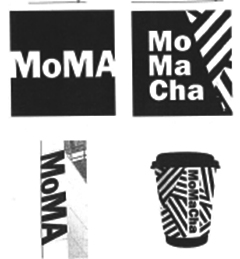
The complaint alleged that the Museum’s marks are famous and that the defendants willfully intended to infringe and dilute that mark, “perhaps even hoping for some free publicity when MoMA inevitably takes additional steps to stop this blatant infringement.” In addition, defendants were said to display modern and contemporary art and to offer café services, all of which the Museum does.
The defendants reportedly said that they adopted their name after an attorney conducted a trademark search, that the Museum’s marks are not that distinctive, and that the defendants have “bent over backwards” to avoid confusion by, among other things, putting a disclaimer message across all social media accounts that it is not affiliated with the Museum. Defendants also changed their mark to all capital letters in a different font.

The Museum moved for a preliminary injunction, and U.S. District Judge Louis L. Stanton issued a preliminary injunction barring the defendant from continuing to use its name, logo and URL until the proceedings are completed. Thereafter, the defendants changed from MOMACHA to MAMACHA, substituting the first letter “O” with the letter “A”, but the Museum has also asserted its objection to the new name.
The Museum of Modern Art v. Momacha IP LLC, 2018 U.S. Dist. LEXIS 173694 (S.D.N.Y. September 28, 2018).
Conflicting sale and license provisions cause trademark storm over restaurant name
Michael Shwartz and his family owned and operated the Camellia Grill restaurant on Carrollton Avenue in New Orleans for decades until it was destroyed in 2005 by Hurricane Katrina. Shwartz and his companies, one of which is Camellia Grill Holdings, Inc. (“CGH”), agreed to sell the business to Hicham Khodr and his companies, one of which is Uptown Grill (“Uptown Grill”).
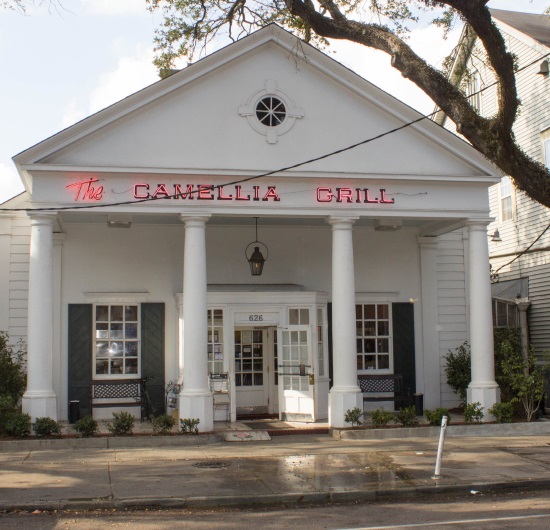
Dan Soto – CC License 3.0
There were three contracts in 2006: (1) Cash Sale of the Carrollton real estate for $490,000; (2) Bill of Sale to Uptown Grill of “tangible personal property” expressly including trademarks for $10,000; and (3) License Agreement permitting use of the trademarks for $1 million.
In 2010, Khodr opened a Camellia Grill on Chartres Street in the French Quarter of New Orleans, even though the parties had been in litigation over the rights to use that name since 2008. Uptown Grill sought a declaration of the parties’ respective rights and CGH asserted trademark infringement for the continued use of the name after the License Agreement had been cancelled pursuant to a decision in an earlier case.
The Bill of Sale stated that it was conveying the following “intangible personal property located within or upon the [Carrollton Avenue location]” and went on to recite “trademarks, names, logos, likenesses, etc.,” among other things. Although CGH argued that the conveyance of “tangible personal property” is in contradiction to the listed intangible property including “trademarks,” the U.S. District Court for the District of Louisiana held that the transfer was unambiguous since the specific provision relating to trademarks controls the general reference to tangible personal property.
The Fifth Circuit affirmed as to the Bill of Sale’s conveyance of the trademarks relating to the Carrollton Avenue location, but remanded to the District Court for a determination of the rights apart from that location, which were not mentioned in the Bill of Sale and which the License Agreement had said were reserved by the Licensor.
On remand, the District Court pointed out that the License Agreement expressly provided that in the event of termination, the licensee and its affiliates would cease to use the marks. Therefore, it found that, although Uptown Grill owned the intellectual property rights relating to the Carrollton Avenue location under the Bill of Sale, it did not have the right to use the restaurant name elsewhere under the express terms of the terminated License Agreement.
Uptown Grill, LLC v. Shwartz, 2018 U.S. Dist. LEXIS 21566 (E.D. La. February 9, 2018). Uptown Grill was subsequently ordered to pay CGH about $22,000 in attorneys’ fees; 2018 U.S. Dist. LEXIS 137683 (E.D. La. August 15, 2018).
HONEY HOLE alcoholic beverages blocks HONEYHOLE SANDWICHES restaurant service mark registration
Honeyhole Sandwiches Inc. sought to register HONEYHOLE SANDWICHES (disclaiming exclusive rights to “Sandwiches”) for “restaurant with bar specializing in serving proprietary unique sandwiches, local beers and alcohol in a vibrant, eclectic environment.” The Examining Attorney refused registration because of the previously registered mark HONEY HOLE for “alcoholic beverages except beers.” The applicant appealed.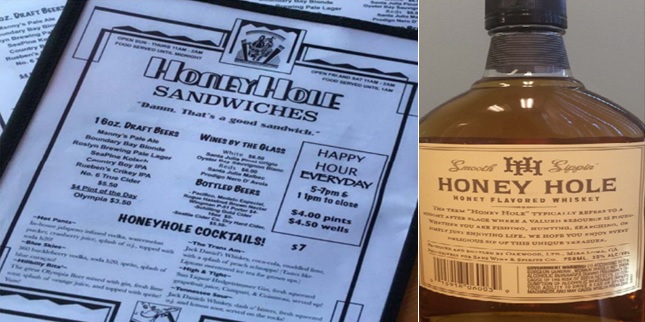
The Trademark Trial and Appeal Board (“TTAB”) affirmed the refusal. It pointed out that to establish a likelihood of confusion, “something more” must be shown than that similar or even identical marks are used for food products and for restaurant services. In this case, the whiskey mark was found to be strong, applicant’s services included “serving .. . alcohol,” and applicant’s menu used HONEYHOLE to identify cocktails it sold. Also, numerous third parties had registered and promoted marks both for alcoholic beverages and restaurant services, further supporting the argument that such goods and services come from a common source.
In re Honeyhole Sandwiches Inc., Application No. 87138294 (T.T.A.B. May 22, 2018). The applicant subsequently abandoned this application.
Many restaurants are facing claimed violations of the Americans with Disabilities Act

What can you do if your restaurant or bar receives a claim, or a so-called “drive-by” lawsuit, that claiming that your facilities, or even your website, is in violation of the Americans with Disabilities Act (“ADA”)?
The ADA Title III, enacted in 1990, seeks to improve access and equality for disabled Americans involving places of public accommodation. The Act and regulations under it require the readily achievable removal of physical barriers to the disabled. These can relate to entrance steps, narrow doorways, doorknobs, wheel chair navigation and turning space, table and counter height, bathroom design, parking lot layout, ramp design and many other items. They also have been applied to websites with pictures lacking descriptions the visually impaired.
Some attorneys have cookie cutter lawsuits that particularly target restaurants. There have been hundreds of these suits, and it has been alleged that some of the plaintiffs have not even entered the premises. These attorneys initially seek quick settlements amounting to several thousand dollars. If they do not get a settlement, they file suit and seek relief which includes an injunction, damages, and also substantial attorneys’ fees.
In 2015 during the 114th Congress, bills were introduced in the House and Senate that would pause these cases for up to 120 days so property owners can make any readily achievable corrections to the alleged ADA violations. The intent was to remove the current incentives for lawsuits and legal fee settlements while improving ADA compliance. However, these bills died in committee when the current Congress was elected in 2016.
One former restaurateur (who closed her Zlfred’s restaurant in Fresno, California after receiving one of these suits) has brought a countersuit in Federal Court alleging that, in asserting these ADA claims, the lawyers and their firms were attempting to extort settlements from small businesses in violation, among other things, of the Racketeer Influenced and Corrupt Organizations Act (“RICO”). The defendants asserted counterclaims that this was just a retaliation against them, and they moved to dismiss the case, but the judge denied the counterclaims and motion so the case is continuing. Saniefar v. Moore et al, 1:17-cv-00823 (E.D. Calif. June 20, 2018).
ABOUT COWAN, LIEBOWITZ & LATMAN
We know the Restaurant & Hospitality Industries. Our clients range from start-ups to some of the world’s leading hotel groups and restaurants.
Our accumulated knowledge and experience enable us to approach legal problems from an advanced starting point, so we do not have to learn at your expense. Our focus is on delivering practical and positive results.
We were founded over 60 years ago, and are recognized worldwide as a leading intellectual property law and litigation firm. We are also experienced in the areas of corporate and commercial law, customs, international cargo and regulatory compliance, information technology, real estate law, tax law, trusts and estates, and military law. We draw talent from our different practice groups to meet your needs in the most efficient and cost-effective manner.
Our attorneys with experience in the Restaurant & Hospitality industries include: William M. Borchard, Kieran G. Doyle, Mary A. Donovan, Midge M. Hyman, Meichelle R. MacGregor, Joel Karni Schmidt, and Deborah K. Squiers.
Prior results do not guarantee a similar outcome.